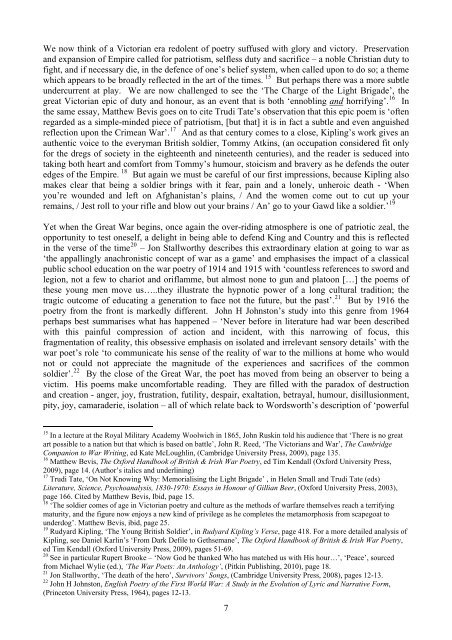Where are the war poets? - Defence Academy of the United Kingdom
Where are the war poets? - Defence Academy of the United Kingdom
Where are the war poets? - Defence Academy of the United Kingdom
Create successful ePaper yourself
Turn your PDF publications into a flip-book with our unique Google optimized e-Paper software.
We now think <strong>of</strong> a Victorian era redolent <strong>of</strong> poetry suffused with glory and victory. Preservation<br />
and expansion <strong>of</strong> Empire called for patriotism, selfless duty and sacrifice – a noble Christian duty to<br />
fight, and if necessary die, in <strong>the</strong> defence <strong>of</strong> one’s belief system, when called upon to do so; a <strong>the</strong>me<br />
which appears to be broadly reflected in <strong>the</strong> art <strong>of</strong> <strong>the</strong> times. 15 But perhaps <strong>the</strong>re was a more subtle<br />
undercurrent at play. We <strong>are</strong> now challenged to see <strong>the</strong> ‘The Charge <strong>of</strong> <strong>the</strong> Light Brigade’, <strong>the</strong><br />
great Victorian epic <strong>of</strong> duty and honour, as an event that is both ‘ennobling and horrifying’. 16 In<br />
<strong>the</strong> same essay, Mat<strong>the</strong>w Bevis goes on to cite Trudi Tate’s observation that this epic poem is ‘<strong>of</strong>ten<br />
regarded as a simple-minded piece <strong>of</strong> patriotism, [but that] it is in fact a subtle and even anguished<br />
reflection upon <strong>the</strong> Crimean War’. 17 And as that century comes to a close, Kipling’s work gives an<br />
au<strong>the</strong>ntic voice to <strong>the</strong> everyman British soldier, Tommy Atkins, (an occupation considered fit only<br />
for <strong>the</strong> dregs <strong>of</strong> society in <strong>the</strong> eighteenth and nineteenth centuries), and <strong>the</strong> reader is seduced into<br />
taking both heart and comfort from Tommy’s humour, stoicism and bravery as he defends <strong>the</strong> outer<br />
edges <strong>of</strong> <strong>the</strong> Empire. 18 But again we must be c<strong>are</strong>ful <strong>of</strong> our first impressions, because Kipling also<br />
makes clear that being a soldier brings with it fear, pain and a lonely, unheroic death - ‘When<br />
you’re wounded and left on Afghanistan’s plains, / And <strong>the</strong> women come out to cut up your<br />
remains, / Jest roll to your rifle and blow out your brains / An’ go to your Gawd like a soldier.’ 19<br />
Yet when <strong>the</strong> Great War begins, once again <strong>the</strong> over-riding atmosphere is one <strong>of</strong> patriotic zeal, <strong>the</strong><br />
opportunity to test oneself, a delight in being able to defend King and Country and this is reflected<br />
in <strong>the</strong> verse <strong>of</strong> <strong>the</strong> time 20 – Jon Stallworthy describes this extraordinary elation at going to <strong>war</strong> as<br />
‘<strong>the</strong> appallingly anachronistic concept <strong>of</strong> <strong>war</strong> as a game’ and emphasises <strong>the</strong> impact <strong>of</strong> a classical<br />
public school education on <strong>the</strong> <strong>war</strong> poetry <strong>of</strong> 1914 and 1915 with ‘countless references to sword and<br />
legion, not a few to chariot and oriflamme, but almost none to gun and platoon […] <strong>the</strong> poems <strong>of</strong><br />
<strong>the</strong>se young men move us…..<strong>the</strong>y illustrate <strong>the</strong> hypnotic power <strong>of</strong> a long cultural tradition; <strong>the</strong><br />
tragic outcome <strong>of</strong> educating a generation to face not <strong>the</strong> future, but <strong>the</strong> past’. 21 But by 1916 <strong>the</strong><br />
poetry from <strong>the</strong> front is markedly different. John H Johnston’s study into this genre from 1964<br />
perhaps best summarises what has happened – ‘Never before in literature had <strong>war</strong> been described<br />
with this painful compression <strong>of</strong> action and incident, with this narrowing <strong>of</strong> focus, this<br />
fragmentation <strong>of</strong> reality, this obsessive emphasis on isolated and irrelevant sensory details’ with <strong>the</strong><br />
<strong>war</strong> poet’s role ‘to communicate his sense <strong>of</strong> <strong>the</strong> reality <strong>of</strong> <strong>war</strong> to <strong>the</strong> millions at home who would<br />
not or could not appreciate <strong>the</strong> magnitude <strong>of</strong> <strong>the</strong> experiences and sacrifices <strong>of</strong> <strong>the</strong> common<br />
soldier’. 22 By <strong>the</strong> close <strong>of</strong> <strong>the</strong> Great War, <strong>the</strong> poet has moved from being an observer to being a<br />
victim. His poems make uncomfortable reading. They <strong>are</strong> filled with <strong>the</strong> paradox <strong>of</strong> destruction<br />
and creation - anger, joy, frustration, futility, despair, exaltation, betrayal, humour, disillusionment,<br />
pity, joy, camaraderie, isolation – all <strong>of</strong> which relate back to Wordsworth’s description <strong>of</strong> ‘powerful<br />
15 In a lecture at <strong>the</strong> Royal Military <strong>Academy</strong> Woolwich in 1865, John Ruskin told his audience that ‘There is no great<br />
art possible to a nation but that which is based on battle’, John R. Reed, ‘The Victorians and War’, The Cambridge<br />
Companion to War Writing, ed Kate McLoughlin, (Cambridge University Press, 2009), page 135.<br />
16 Mat<strong>the</strong>w Bevis, The Oxford Handbook <strong>of</strong> British & Irish War Poetry, ed Tim Kendall (Oxford University Press,<br />
2009), page 14. (Author’s italics and underlining)<br />
17 Trudi Tate, ‘On Not Knowing Why: Memorialising <strong>the</strong> Light Brigade’ , in Helen Small and Trudi Tate (eds)<br />
Literature, Science, Psychoanalysis, 1830-1970: Essays in Honour <strong>of</strong> Gillian Beer, (Oxford University Press, 2003),<br />
page 166. Cited by Mat<strong>the</strong>w Bevis, Ibid, page 15.<br />
18 ‘The soldier comes <strong>of</strong> age in Victorian poetry and culture as <strong>the</strong> methods <strong>of</strong> <strong>war</strong>f<strong>are</strong> <strong>the</strong>mselves reach a terrifying<br />
maturity, and <strong>the</strong> figure now enjoys a new kind <strong>of</strong> privilege as he completes <strong>the</strong> metamorphosis from scapegoat to<br />
underdog’. Mat<strong>the</strong>w Bevis, ibid, page 25.<br />
19 Rudyard Kipling, ‘The Young British Soldier’, in Rudyard Kipling’s Verse, page 418. For a more detailed analysis <strong>of</strong><br />
Kipling, see Daniel Karlin’s ‘From Dark Defile to Gethsemane’, The Oxford Handbook <strong>of</strong> British & Irish War Poetry,<br />
ed Tim Kendall (Oxford University Press, 2009), pages 51-69.<br />
20 See in particular Rupert Brooke – ‘Now God be thanked Who has matched us with His hour…’, ‘Peace’, sourced<br />
from Michael Wylie (ed.), ‘The War Poets: An Anthology’, (Pitkin Publishing, 2010), page 18.<br />
21 Jon Stallworthy, ‘The death <strong>of</strong> <strong>the</strong> hero’, Survivors’ Songs, (Cambridge University Press, 2008), pages 12-13.<br />
22 John H Johnston, English Poetry <strong>of</strong> <strong>the</strong> First World War: A Study in <strong>the</strong> Evolution <strong>of</strong> Lyric and Narrative Form,<br />
(Princeton University Press, 1964), pages 12-13.<br />
7

















